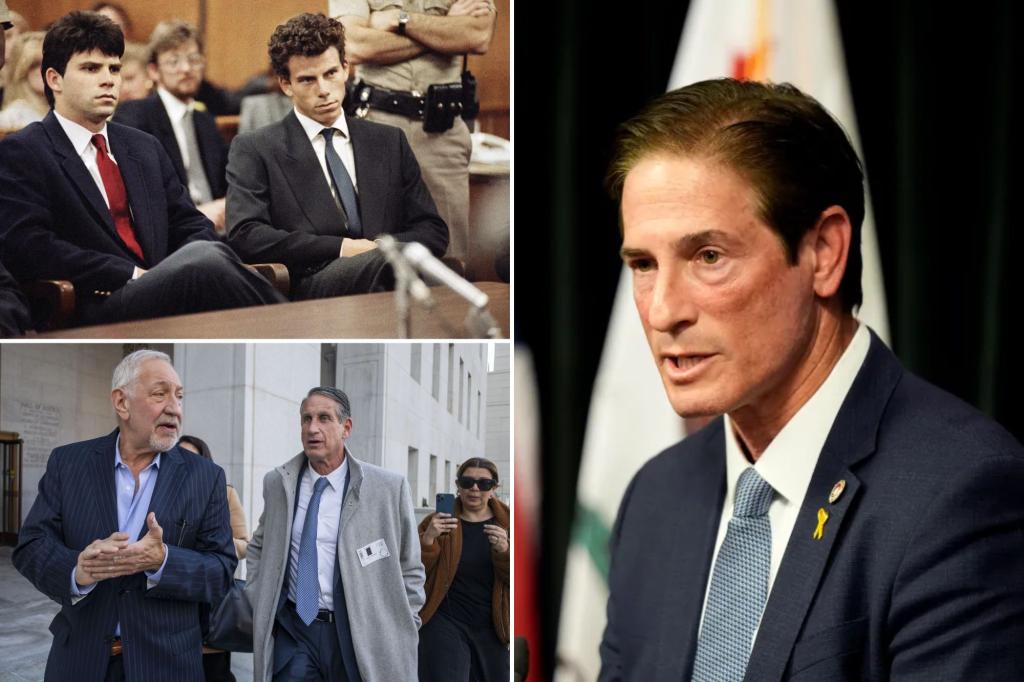The case of the Menendez brothers, Lyle and Erik, continues to captivate public attention over three decades after their conviction for the 1989 murders of their parents, Jose and Kitty Menendez. Originally sentenced to life in prison without parole, the brothers have renewed their fight for freedom, citing newly emerged evidence of alleged sexual abuse by their father, Jose Menendez. This evidence has spurred a re-examination of their case, prompting legal maneuvers and a renewed public debate about the brothers’ guilt, the fairness of their original trial, and the impact of childhood trauma on their actions.
In a significant development, Los Angeles County District Attorney Nathan Hochman, who assumed office in December 2024, recently met with the Menendez family for over three hours. This meeting, characterized by Hochman as “productive,” allowed family members to share their perspectives on the brothers’ potential release. Hochman’s engagement signals a thorough review of the case, including an assessment of the brothers’ rehabilitation during their incarceration. This follows a recommendation by former District Attorney George Gascon for resentencing the brothers to 50 years to life, a move that would have made them immediately eligible for parole. Hochman, at the time running against Gascon, criticized this recommendation as a politically motivated maneuver, casting doubt on the impartiality of the decision.
The brothers’ current legal strategy centers on a habeas corpus petition filed in May 2023. This legal avenue allows the court to determine the legality of their continued detention. The petition rests heavily on the newly surfaced evidence of Jose Menendez’s alleged sexual abuse, arguing that this crucial information was not adequately considered during the original trials. The brothers’ defense team asserts that in today’s legal climate, with heightened awareness of the long-term psychological impact of sexual abuse, their convictions and sentences would likely be different. They contend that a jury presented with this evidence would be less inclined to find them guilty of first-degree murder and impose life sentences.
Lyle and Erik Menendez, now in their 50s, have garnered the support of a substantial portion of their extended family in their pursuit of freedom. These family members echo the brothers’ legal arguments, emphasizing that a contemporary understanding of childhood trauma would lead to a more nuanced assessment of their actions. They maintain that decades of imprisonment constitute sufficient punishment and that the brothers, having undergone significant rehabilitation, deserve a chance at release. The family’s unwavering support provides a compelling human dimension to the complex legal proceedings, underscoring the emotional toll of the case on those closest to the situation.
The original trials, held in the early 1990s, focused heavily on the prosecution’s narrative of greed as the primary motive for the murders. While the defense presented arguments of sexual abuse, these were ultimately unsuccessful in persuading the jury. The prosecution effectively portrayed the brothers as motivated by a desire to inherit their parents’ considerable wealth, ultimately securing convictions and life sentences. Subsequent appeals by the brothers failed to overturn these convictions, leaving them incarcerated for decades. However, the emergence of new evidence has rekindled hopes for a different outcome and cast a shadow over the seemingly settled narrative of the case.
District Attorney Hochman’s current review involves a comprehensive examination of thousands of pages of prison records. He has stated that his evaluation will focus on “the rehabilitation aspect of resentencing,” considering factors such as the brothers’ behavior in prison, any participation in programs aimed at self-improvement, and whether they have contributed positively to the prison community. These factors will play a crucial role in determining whether he supports a potential resentencing. A judge delayed a resentencing hearing initially scheduled for December 2024 to January 2025, providing Hochman with ample time to thoroughly examine the evidence and formulate his position. The brothers remain incarcerated at the Richard J. Donovan Correctional Facility in San Diego, awaiting the outcome of these crucial legal proceedings. The Menendez brothers’ case continues to be a stark reminder of the complexities of the justice system, the evolving understanding of trauma, and the enduring power of family bonds in the face of unimaginable tragedy.

